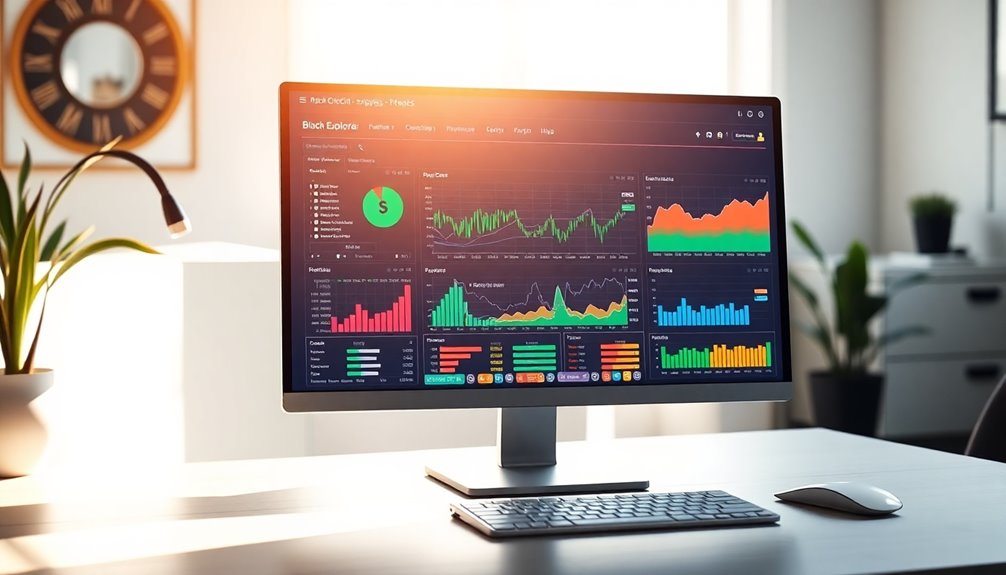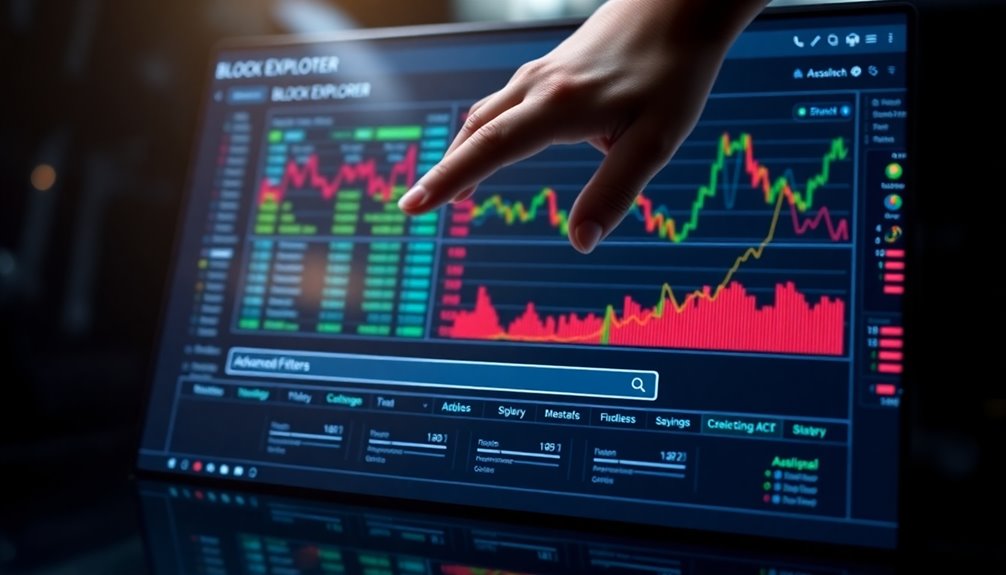A block explorer is your go-to tool for navigating and tracking blockchain data and transactions. Think of it as a search engine tailored specifically for cryptocurrencies. With a block explorer, you can quickly check transaction statuses, view detailed information about addresses, and explore block data using transaction IDs. It's essential for maintaining transparency in the blockchain world. While it offers powerful insights, be mindful of its complexity, especially if you're new to crypto. There's a lot more to learn about how block explorers work and their various functionalities, so you might want to explore further.
Key Takeaways
- A block explorer is a tool for viewing and accessing blockchain data and transactions, similar to a search engine for blockchains.
- Each cryptocurrency has its dedicated block explorer to provide accurate and relevant transaction information.
- Users can track transactions using a transaction ID (TXID) to view details like sender and recipient addresses, amounts, and timestamps.
- Block explorers enhance transparency by allowing users to verify transactions and monitor network activity in real-time.
- They can pose security risks, such as phishing attacks, so it's essential to use reputable explorers and follow best security practices.
Core Functionalities Explained

Block explorers serve as essential tools for navigating the blockchain, allowing you to access a wealth of information about transactions, blocks, and addresses.
You can easily track transactions by entering a transaction ID (TXID) to see details like the sender and recipient addresses, the amount transferred, transaction fees, and the timestamp of when it was processed. Additionally, block explorers provide real-time updates on blockchain activity, helping users stay informed about the latest transactions and blocks.
If you're curious about a specific block, you can search by height or hash to view its details, including the block size and the miner's address.
Additionally, block explorers help you check the transaction history of any wallet address, revealing current balances and activity patterns.
With these functionalities, you gain valuable insights into the blockchain ecosystem.
Overview of Block Explorers

Navigating the complex world of blockchain technology becomes easier with a block explorer, a vital tool that grants you access to critical information about various cryptocurrencies.
Think of it as a browser and search engine for blockchains, providing you with a user-friendly interface to explore detailed blockchain metrics. Each cryptocurrency has its own specialized block explorer, ensuring you get accurate and relevant data.
You can find network statistics, block details, transaction information, and even historical data. Whether you want to check transaction statuses, analyze wallet balances, or monitor network activity, a block explorer equips you with real-time insights. Additionally, they offer real-time monitoring of blockchain activities, enhancing your ability to track performance.
It's an essential resource for anyone looking to dive deeper into the blockchain ecosystem and make informed decisions.
Transaction Tracking Process

With a block explorer at your fingertips, tracking transactions on the blockchain becomes a straightforward process.
First, visit a blockchain explorer website specific to your blockchain of interest, like Bitcoin or Ethereum. Enter the transaction ID, sender, or recipient wallet address into the search bar. You'll then see detailed information about the transaction, including the amount transferred, timestamp, and transaction fees.
Check the confirmation status and block height as well. You can also explore the transaction history linked to a wallet address, reviewing past transactions and their statuses. This process enhances transparency through a distributed ledger system, allowing anyone to verify the legitimacy of transactions.
For deeper insights, analyze network activity, view the latest blocks, and check for double-spend incidents to enhance your understanding of blockchain dynamics.
Pros and Cons Analysis

While exploring the world of blockchain, you'll find that block explorers offer a mix of advantages and drawbacks.
On the plus side, they enhance transparency by providing open access to transaction data, helping you verify the validity of transactions. They also improve user experience with user-friendly interfaces and visualization tools, making blockchain data accessible to everyone. Additionally, the real-time data provided by block explorers allows users to stay informed about the status of their transactions and network activity.
However, the complexity and overwhelming amount of data can be daunting for newcomers, presenting a learning curve. Scalability issues may impede performance during high network activity, and data privacy concerns arise since transaction history is publicly visible.
Ultimately, while block explorers are valuable tools, they come with challenges that require some technical understanding and ongoing education.
Block Explorers vs. Traditional Explorers

Understanding the differences between block explorers and traditional web explorers is key to maximizing your interaction with digital information.
Block explorers specialize in searching for transactions, blocks, and wallet addresses on a blockchain, giving you detailed insights like transaction amounts, timestamps, and network statistics. You can track a cryptocurrency's journey and monitor smart contracts easily. Additionally, they enhance transparency by allowing public access to blockchain data, which eliminates reliance on centralized authorities for information verification.
In contrast, traditional explorers use keywords for broader web searches, providing a mix of content without specific blockchain data. They don't offer real-time updates or tools to verify transactions.
While traditional explorers excel at general research, block explorers are designed for in-depth blockchain analysis, making them essential for anyone actively engaging with cryptocurrency and digital assets.
Security Vulnerabilities in Block Explorers

As block explorers play a vital role in navigating the complexities of blockchain transactions, they also face significant security vulnerabilities that can jeopardize user data. These explorers can be targets for phishing attacks and other malicious tactics, like routing attacks that might lead to 51% compromises. Additionally, unauthorized access can expose sensitive information, such as wallet addresses and transaction amounts. To mitigate these risks, secure coding practices, data encryption, and frequent updates are essential. Implementing robust access controls and using reputable explorers can further minimize threats. Furthermore, the growing acceptance among merchants of digital currencies highlights the importance of ensuring the security of these tools to maintain user trust.
Real-Time Data Integration Tools

Real-time data integration tools are essential for efficiently managing blockchain data, especially in a landscape where speed and accuracy are paramount.
These tools ensure exactly-once delivery, making your data re-org proof, while transforming raw blockchain data into structured formats for deeper analysis. You can monitor events in real-time, triggering automated workflows as needed. Additionally, blockchain ETL solutions simplify working with complex, unstructured blockchain data, enabling analysis and visualization.
Seamlessly integrate blockchain data with external databases, handling large volumes effortlessly. Custom filters allow you to apply specific patterns, enhancing cost efficiency by charging only for filtered data.
With advanced API and GraphQL capabilities, you can request precise data, reducing over-fetching.
Ultimately, these tools provide the foundation for robust data management and insightful analytics, powering your blockchain applications effectively.
Utilize Advanced Search Filters

Advanced search filters in block explorers can significantly enhance your data retrieval experience. By utilizing these filters, you can quickly find transactions based on senders and recipients, specific date ranges, or transaction types like withdrawals and deposits.
You'll save time by narrowing down your results, making it easier to locate precise data, such as transactions involving a certain address or those from a particular year. Moreover, combining multiple filters can yield even more specific results. Many explorers also let you save your queries for future use. This feature comes in handy for frequent searches, whether for tax filing or tracking suspicious activity.
With improved accuracy and efficient searches, advanced filters empower you to access relevant blockchain data effortlessly. Additionally, the recent introduction of advanced search features enhances user experience by allowing for more granular search capabilities.
Frequently Asked Questions
How Do I Choose the Best Block Explorer for My Needs?
To choose the best block explorer for your needs, start by identifying the specific blockchain you're interested in, like Bitcoin or Ethereum.
Look for explorers that provide real-time data, historical access, and user-friendly interfaces. Check if they support multiple cryptocurrencies and offer robust search capabilities.
Evaluate advanced features like transaction monitoring and address tracking.
Lastly, consider community reputation and developer support to ensure you have reliable resources at your disposal.
Can Block Explorers Display Transaction Fees or Costs?
Think of a compass guiding you through a dense forest; it reveals crucial paths and hidden obstacles.
Similarly, block explorers can display transaction fees, illuminating the costs tied to your transactions.
You can easily track these fees by searching transaction IDs or wallet addresses.
This real-time data helps you navigate fluctuating fees, allowing you to prioritize transactions wisely and manage your expenses effectively, ensuring you stay on course in the crypto landscape.
Are Block Explorers Available for All Cryptocurrencies?
Block explorers aren't available for every cryptocurrency, but many popular ones have dedicated explorers.
You'll find specific explorers for major coins like Bitcoin and Ethereum, like Blockchain.com and Etherscan. Some explorers, such as GetBlock and CryptoMus, support multiple blockchains, giving you a broader view.
However, smaller or newer cryptocurrencies might lack dedicated explorers, so you'll need to check if one exists for the particular coin you're interested in.
How Often Is the Data on Block Explorers Updated?
Imagine peering into a digital crystal ball, but its visions aren't always instant.
The data on block explorers gets updated when new blocks are verified and added, which varies by blockchain—like Ethereum's roughly 13-second intervals.
However, don't expect real-time updates for everything; while recent transactions might pop up, many details lag behind.
If you're after the freshest stats, look towards mempool explorers for a more dynamic glimpse into the network.
Do Block Explorers Offer Mobile Applications or Interfaces?
Yes, block explorers do offer mobile applications and interfaces.
You can find apps like the Fantom Blockchain Explorer for iOS, which lets you monitor transactions and accounts directly from your phone.
These apps provide real-time notifications and features to organize your addresses, making it easier to manage your blockchain activities on the go.
With user-friendly designs, you'll enjoy seamless access to blockchain data wherever you are.
Conclusion
In summary, block explorers are invaluable tools for anyone navigating the world of cryptocurrencies. They let you track transactions, view block information, and ensure transparency in the blockchain. But, with potential security vulnerabilities, can you afford to rely solely on these explorers without a deeper understanding of their limitations? By utilizing advanced search filters and real-time data tools, you can enhance your experience and make informed decisions in this dynamic digital landscape.









